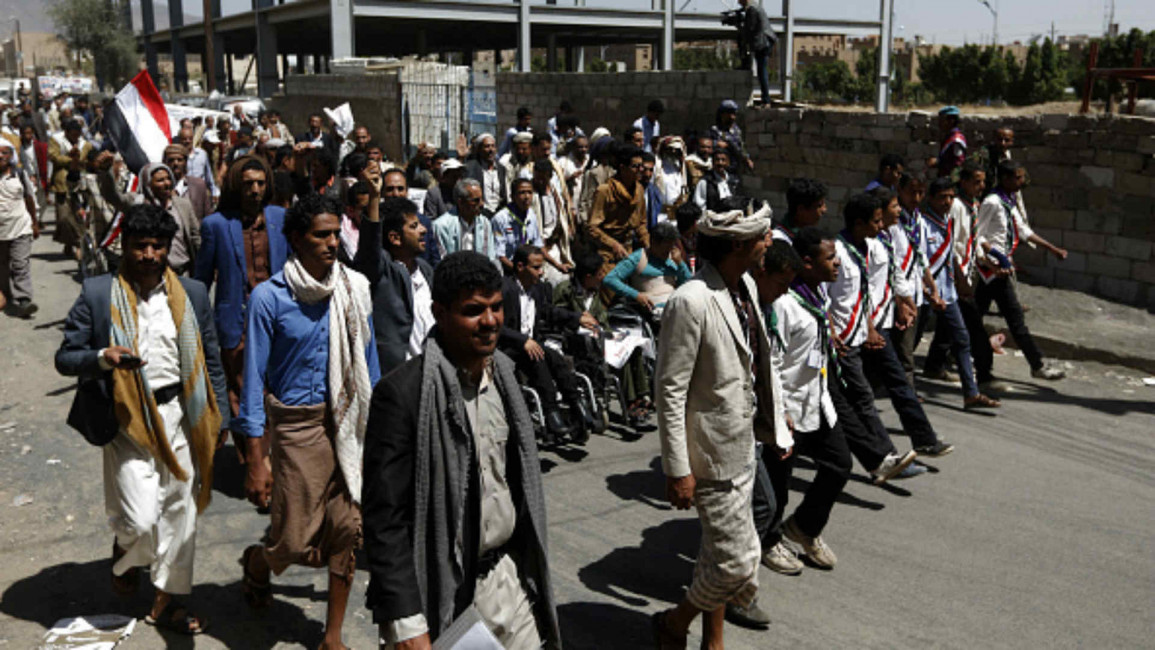
Hodeida's looming battle will starve Yemen
In the meantime, the US is fully poised to back what they say will be a UAE military takeover of the port city, currently under Houthi control. The UN, however, has warned against the intervention because it will cut off a vital lifeline for Yemen's civilians, potentially tipping the country into a full-scale famine.
UN agencies have released repeated warnings and troubling figures highlighting just how desperate the population has become. Seventeen million Yemenis already experience food insecurity and over 460,000 children suffer from severe acute malnutrition. Seven of the 22 governorates and 6.8 million people are at "phase four food insecurity" - phase five is famine.
Food as a weapon
Even more worryingly, the famine that looms on Yemen's horizon is a completely man-made situation. Targeting food is a military strategy; in Yemen food is a weapon of war.
Martha Mundy, a professor at the London School of Economics refers to this as a "scorched earth policy", as the coalition is targeting agricultural lands, roads and food trucks.
 |
|
| Disabled Yemenis take part in a 'protest for bread' march from the capital Sanaa to the coastal town of Hodeida [AFP] |
In addition, the Houthis have created a blockade encircling key strategic cities such as Taiz. A recent Human Rights Watch report found that the unauthorised landmines being used by Houthi-Saleh rebels are exacerbating long-term hunger and casualties.
The effects of landmines last well beyond conflict and have serious implications for food security, as stunted agricultural output and physical disabilities will hinder farming capacities.
An attack on Hodeida by the Saudi-led coalition would effect a key entry point for international aid. The think tank International Crisis Group also warns that cutting off vital supplies to opponents will have a disproportionate effect on civilians.
 |
Cutting off vital supplies to opponents will have a disproportionate effect on civilians |  |
Both coalition allies and rebels have both made efforts to stop aid in the past. The Houthis through diversion, restricting access and denying visas, and in some cases, detaining aid workers.
Yemen is 90 percent dependent on imports for staple commodities. The naval blockade, under the guise of a UN Security Council Resolution that called for an arms embargo on the rebels, took down imports by 85 percent prompting the initial warnings of famine.
| Read more: Yemen's wheat stocks to be 'depleted by April' | |
By the time the security council had put in place a UN Verification and Inspection Mechanism (UNVIM) that eased restrictions, coalition airstrikes had already done considerable damage as withheld or delayed permission for vessels to dock at the port created a bottle neck and "de facto blockade".
 |
Where food is available no-one can buy it because of the non-payment of public salaries |  |
Airstrikes also destroyed an entire UN World Food Program warehouse and four port authority cranes, severely reducing the port's capacity.
 |
|
| Hodeida port handles 30% less in tonnage after its cranes were bombed in 2015. [Giles Clarke for UN-OCHA] |
This is all coupled with economic strangulation in the country through the decentralisation of the national bank, which isn't receiving revenue, and the non-payment of public salaries that means where food is available no-one can buy it.
The international community's fuel to the fire
Yemen's trajectory appears catastrophic and international intervention in the form of diplomacy is desperately needed.
But foreign intervention has already exacerbated this disaster through arms sales and backing to the coalition through military aid and training.
Furthermore, Yemen's conflict receives nowhere near the level of news coverage debate within parliament it deserves.
A poll conducted by The Independent found only 49 percent those surveyed knew of the country's ongoing civil war, and only 37 percent of 18 to 24-year-olds, even after two whole years of conflict.
Despite this desperate situation, UN Security Council meetings to draft resolutions that guarantee humanitarian access in both Syria and Yemen, have failed because of Saudi's influence in the US, the UK and other security council members.
The tactics of this war are not affecting just the warring parties. Civilians are suffering indiscriminate armed violence, but also the targeting of vital resources such as food. Such tactics are illegal and the international must act to put a stop to this.
Sophia Akram is a researcher and communications professional with a special interest in human rights particularly across the Middle East. Follow her on Twitter: @mssophiaakram
Opinions expressed in this article remain those of the author and do not necessarily represent those of The New Arab, its editorial board or staff


![President Pezeshkian has denounced Israel's attacks on Lebanon [Getty]](/sites/default/files/styles/image_684x385/public/2173482924.jpeg?h=a5f2f23a&itok=q3evVtko)



 Follow the Middle East's top stories in English at The New Arab on Google News
Follow the Middle East's top stories in English at The New Arab on Google News


